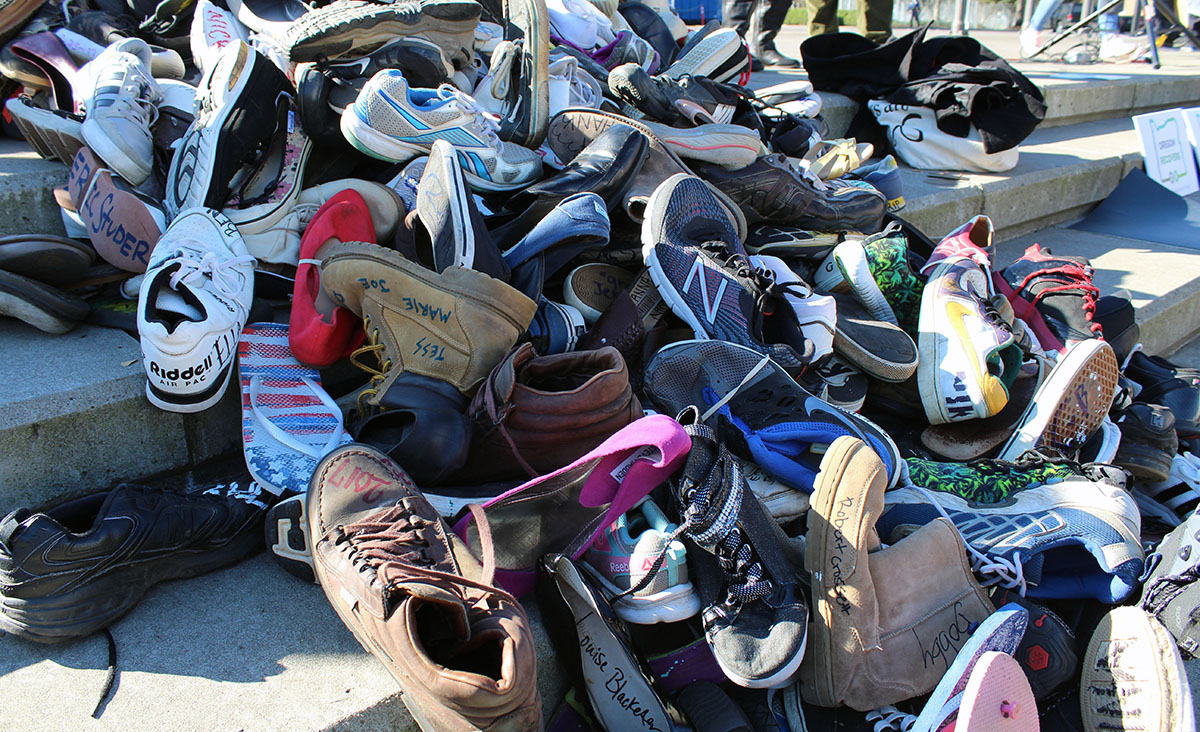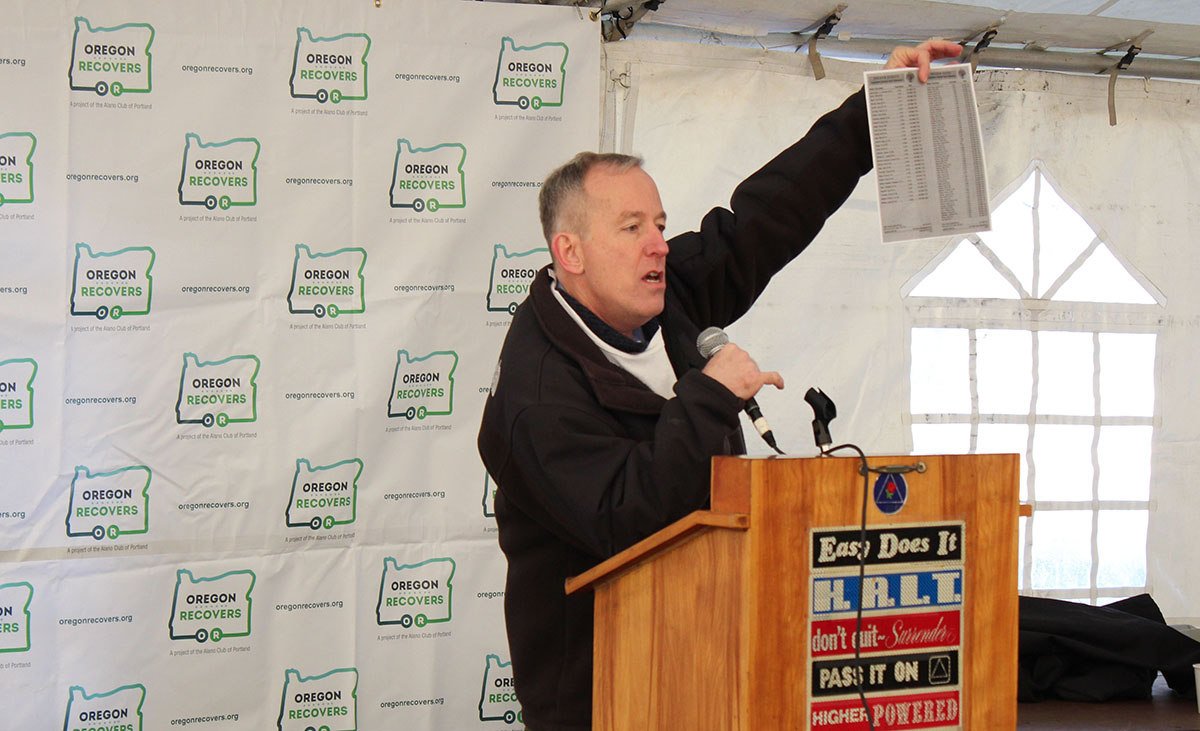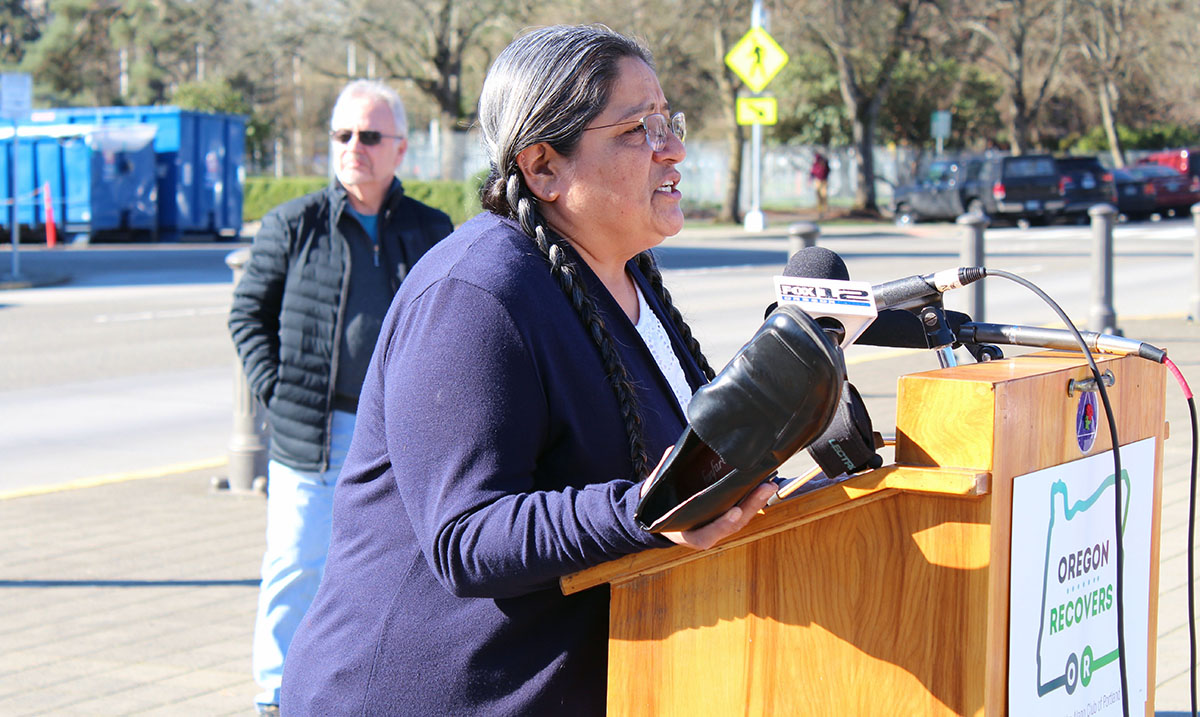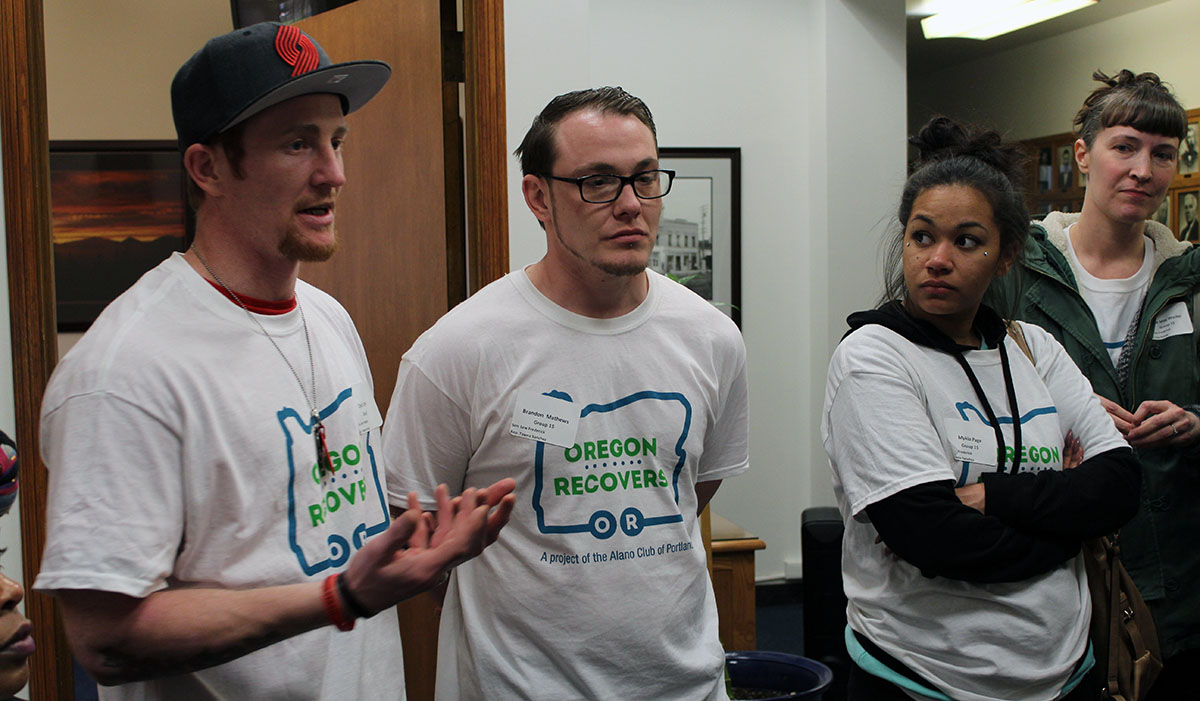Jay Z’s “Marcy Me” reverberated throughout the room, drowning out sounds of billiard balls knocking into each other as a couple of 20-somethings in baggy clothes swung their cues. About a dozen other young adults lounged around black leather sofas arranged in a square nearby. Some had face and neck tattoos; most carried a conditioned persona, showcasing their street cred.
Outside on the back patio, three men compared rap sheets and war stories as they smoked cigarettes. One passed around his most recent mug shot, displayed on his smartphone. “I got caught with a gun,” he said.
It was 7 a.m. on Tuesday, Feb. 13, and these unlikely lobbyists were all waiting for a bus to take them from Portland to Salem, where they planned to walk the halls of the Capitol building, sharing their stories with lawmakers.
While most had never talked to a legislator before – and weren’t sure what they would say when they did – they were unflinching in their determination to have their voices heard. They know firsthand how difficult it can be to access drug and alcohol treatment in Oregon, and today they were going to do something about it.
The majority were members of the 4th Dimension Recovery Center on Northeast Martin Luther King Jr. Boulevard, where they had begun gathering at 6 that morning. It’s a place where people ages 13 to 35 who are in recovery from substance abuse can get addiction treatment and support or simply hang out with other young people who are also in recovery.
Also there, waiting for the bus, were several older, more professionally dressed men and women in recovery programs just up the road at Volunteers of America, along with a few drug and alcohol counselors and peer mentors.
Once in Salem, they would all join a lobby day rally organized by Oregon Recovers, a coalition led by people in long-term recovery.

Oregon Recovers is attempting to do something that’s never been done before in Oregon: bring together the thousands of Oregonians who are in recovery to form a constituency aimed solely at reforming what they say is a fractured and under-funded system of drug and alcohol treatment, prevention and recovery programs.
Its vision is for Oregon to become a state where anyone can have immediate access to effective drug and alcohol treatment when they need it, followed with continuing community-based support. It wants addiction to be recognized as a health issue, not a criminal justice issue, and to incorporate a broad range of treatment and recovery options that include harm reduction strategies.
While it’s unknown exactly how many people in Oregon are in recovery from substance abuse, nationwide, it’s estimated at roughly 25 million people, according to a 2016 report from the U.S. Surgeon General.
That’s why Tony Vezina, director of the 4th Dimension Recovery Center and a key organizer at Oregon Recovers, says he hopes to see hundreds of thousands more join the statewide effort as it progresses.
If harnessed, it’s a constituency whose sheer size could give it tremendous political power, but the stigma and shame attached to substance abuse is a challenge organizers know they have to overcome.
The school bus that would transport the group south that morning was running late after malfunctioning in sub-freezing temperatures, but it finally rolled up just before 8 a.m.
Many of the more than 30 people onsite told Street Roots that, despite trying, they weren’t able to access meaningful drug and alcohol treatment until after they were arrested and charged with a crime.
When a person enters publicly funded treatment through the court system, many additional costs are also incurred, from court processing to time spent in prison. In Oregon, substance abuse costs taxpayers more than $650 million per year in criminal justice expenses alone, based on the most recent calculation of statewide costs of addiction, done in 2006.
There are also costs to the state’s underfunded and overburdened foster care system. Alcohol and drug abuse was the single largest family “stress factor” among Oregon households where child abuse and neglect were present, according to the 2016 Child Welfare Data Book.
Linda Wacker, a program manager at Morrison Child and Family Services in Portland, said she’s worked with parents who have had to wait months to get into treatment for alcohol and drug abuse. Meanwhile, their children may be in foster care. That day, she would tell lawmakers that people in substance abuse treatment programs are often a product of foster care themselves, completing the vicious circle.
On the bus ride down to Salem, a young father named Will Mora said he planned to tell lawmakers that there should be more treatment options for families. Beneath his black wave cap and baby blue hoodie, Mora had a twinge of sadness in his eyes as he spoke about missing his four small children, ranging in age from infant to 5 years old.
After being homeless, sleeping in tents and a motor home for about two years, he said his wife and children are now staying with family while he’s in court-ordered treatment. In the meantime, he’s separated from them.
“When people have to leave their significant other and kids, they’re more hesitant to go into treatment,” he said.
The need for more residential treatment facilities that allow families to stay together came up repeatedly throughout the day as Street Roots asked people in recovery what they would like to see change in the state’s alcohol and drug programs.
But resoundingly, the No. 1 problem people in recovery said needed fixing is the long wait lists for in-patient treatment.
For some people struggling with addiction, waiting a few weeks to get into treatment can be the difference between life and death.
Mykia Page said she’s lost a “few close friends” to drug overdose. One of them was on a waitlist for residential treatment when he relapsed and died of a heroin overdose about a year ago, she said.

Another issue that resurfaced again and again throughout the day was the length of time treatment programs last. Many people in recovery said it’s misleading to tell someone they are “graduating” from a program after a certain number of weeks or months have passed.
Recovery is lifelong work, and people need support that stays with them long after they exit rehab, many said. This is why creating a system of long-term recovery and support is a main tenet of Oregon Recovers’ platform.
Nancy Lisicki said she’d like to see drug and alcohol program providers adhere to a “policy-bound method” of keeping in contact with graduates long after they leave. Her son had “graduated” from a 30-day residential treatment program. But, she said, “it wasn’t long enough. My son died.”
Page went through residential treatment programs three times before she was able to stay off methamphetamine for good. The first time, she stayed clean for six months. But the second time, after graduating from a program at St. Vincent De Paul that lasted 58 days, she stayed clean for only four days after leaving the program.
“I felt OK. I was excited to get out,” she said, “but 58 days wasn’t long enough for me.”
The third time Page entered treatment, it was after discovering while in jail that she was pregnant. Now she’s been clean for 2½ years and works as a recovery mentor at the 4th Dimension Recovery Center. On Sunday afternoons, she leads a group for other young single moms in recovery, where they can vent and share their struggles.
Once the bus arrived in Salem, its passengers joined a crowd of nearly 200 people, all either in recovery or there as an ally.
Oregon Recovers co-founder and director Mike Marshall said he was “thrilled” with the turnout. The goal was to recruit 100 people, but they ran out of the Oregon Recovers T-shirts and lobbying packets, and they had brought 150 of each.
“This is our first year doing this, and it’s been a huge success,” Marshall said. “To see people in recovery stand up and turn recovery into power – it’s amazing to watch.”

Marshall, former executive director of City Club of Portland, has been in recovery for more than nine years.
He said a big challenge for the state moving forward is finding new ways to connect people to treatment. Oregon has long relied on the criminal justice system as an intervention tool, but fewer people will be incentivized into court-ordered treatment now that simple drug possession is no longer a felony for first- and second-time offenders with no prior felony convictions.
One answer may lie in the governor’s opioid bill. It was one of the two bills on Oregon Recovers’ agenda for lobbying that day, and it would create a pilot program aimed at creating a link between drug overdose and access to treatment.
House Bill 4143 would also require licensed prescribers to register with the Prescription Drug Monitoring Program and initiate a study on insurance barriers to accessing drug and alcohol treatment.
The other bill was House Bill 4137, which would require the Oregon Drug and Alcohol Policy Commission to complete a strategic plan for improving the state’s substance abuse prevention, treatment and recovery programs. Oregon Recovers sees the completion of this long-overdue plan as a crucial first step toward reform.

After a quick coaching session and armed with plenty of statistics and information packets, Maylene Grier and Dan Loynes, both former intravenous drug users, walked up the Capitol steps to lobby for the first time in their lives.
Grier has been clean for nearly eight years, and Loynes just celebrated nine years clean earlier this month. Now they draw on their past experiences in their work with people struggling with addiction. Grier works with parents whose children are in state custody through her job with Volunteers of America in Portland, and Loynes works at Bridges to Change in Salem as a certified recovery mentor, working with men coming out of the Oregon State Penitentiary.

Their first stop was the office of Sen. Jackie Winters (R-Salem) on the third floor. They were visibly nervous as they discussed who would say what in the hallway outside her office.
Upon entering, they were slightly disappointed to discover they would be speaking with a staff member instead of the senator herself. This would be the case for most Oregon Recovers appointments in various offices throughout the day. Much of this was due to the timing – it was just over a week into a busy but short legislative session.
Unshaken, Grier and Loynes pleaded their case to Winters’ two-year staff member Liz Hartman. They began by recounting their own history of drug use, how they triumphed with the help of treatment and now help others battle their addictions.
“There are success stories,” Grier said.
But, they said, the state isn’t giving them the tools necessary to help all the people who need it, when they need it.
“You get a person into detox, where they’re ‘shakin’ and bakin’ as we say, but where do they go from there?” Grier asked. “We’re really good at treating the acute phase, but we need a continuum of care.”
Loynes added, “This is so big, if we don’t address it and really prioritize it, it’s going to become an arterial flow.”
While 1 in 10 Oregonians struggles with drug or alcohol addiction, only 11 percent of those people receive treatment, according to an Oregon Substance Use Disorder Research Committee report released in November. The national average is 14 percent.
Lori Guerrero, a supervisor at Volunteers of America who is in long-term recovery, said one of the greatest needs in Oregon is additional residential treatment beds for single dads, in addition to the need for access to treatment when people need it.
But when asked what she would improve or change about the state’s alcohol and drug programming if she had a magic wand and just one wish, she simply stated, “More.”
Later that day, Page and seven others, all wearing Oregon Recovers T-shirts, walked into House Speaker Tina Kotek’s office for their 2:30 p.m. appointment. When the receptionist told them they weren’t on Kotek’s calendar, several of the young men did not hide their disappointment. “That’s some bullshit,” one said as he walked out the door.

Two others decided to go back into the office and demand someone speak with them. It worked. The group was invited back into the office, where Kotek’s legislative deputy director heard them out.
This group had better luck with their next appointment, where Sen. Lew Frederick (D-Portland) met with them in person and was candid when telling them about how addiction has touched his own family.

Just before lunchtime, everyone gathered outside the Capitol once again for speeches and an announcement from Gov. Kate Brown. Many held signs; some read “4 deaths a day is unacceptable,” “I’m sick of my friends dying” and “Addicts Matter.”
In a short speech, Brown declared that substance abuse is a “public health crisis in Oregon.”
It was an announcement Oregon Recovers had advocated for in the past six months, and one that left many onlookers optimistic and rejuvenated as they headed back inside to talk to more lawmakers.

The governor also announced she would sign an executive order that, like one of the bills Oregon Recovers was promoting that day, would require the Oregon Alcohol and Drug Policy Commission to come up with a comprehensive plan for improving the state’s substance abuse programs.
“The governor has a stake in it,” Marshall said not long after the announcement. “That’s why today is so important – it’s a beginning, not an end.”
Oregon Recovers is determined to push policymakers to make Oregon go from being one of the worst states in the nation when it comes to access to addiction treatment to becoming one of the best – within the next five years. It’s a lofty goal, but to those walking through the Capitol halls that day, it’s a necessary one.
“I wasn’t a priority if I wasn’t in jail,” Page told the crowd shortly before Brown took the mic. “And that’s not OK.”
Update March 29, 2018: On March 27, Oregon Gov. Kate Brown signed into law the two bills Oregon Recovers was advocating for on its trip to Salem: the governor's opioid bill and House Bill 4137, to require the Oregon Drug and Alcohol Policy Commission to complete a plan for improving the state’s substance abuse prevention, treatment and recovery programs.
Email Senior Staff Reporter Emily Green at emily@streetroots.org. Follow her on Twitter @greenwrites.

